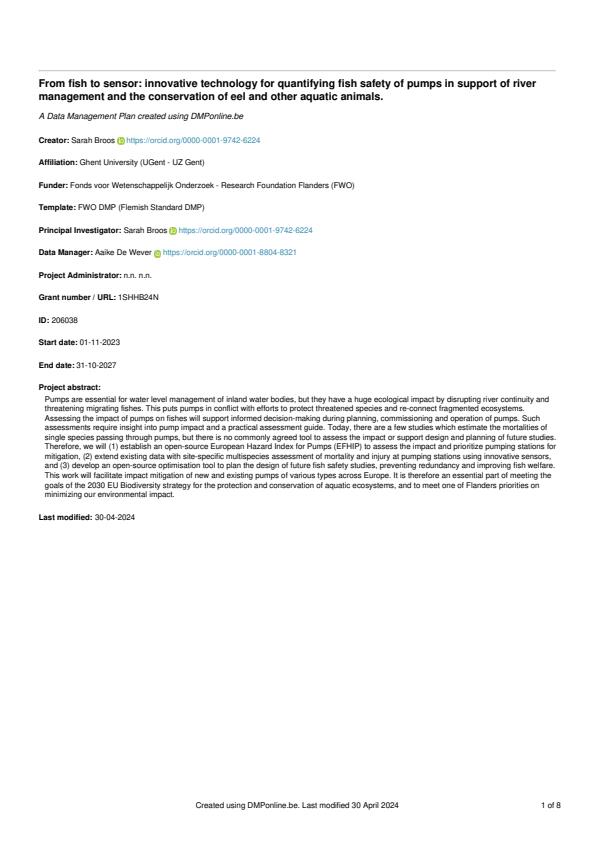From fish to sensor: innovative technology for quantifying fish safety of pumps in support of river management and the conservation of eel and other aquatic animals.
migrating fishes. This puts pumps in conflict with efforts to protect threatened species and re-connect fragmented ecosystems. Assessing the
impact of pumps on fishes will support informed decision-making during planning, commissioning, and operation of pumps. Such assessments
require insight in pump impact and a practical assessment guide. Today few studies estimate mortalities of single species passing through pumps,
but no commonly agreed tool assesses the impact, and supports design and planning of future studies. Therefore, we will (1) establish an opensource European Hazard Index for Pumps (EFHIP) to assess the impact and prioritize pumping stations for mitigation, (2) extend existing data with
site-specific multispecies assessment of mortality and injury at pumping stations using innovative sensors, and (3) develop an open-source
optimisation tool to plan the design of future fish safety studies, preventing redundancy and improving fish welfare. This work will facilitate impact
mitigation of new and existing pumps of various types across Europe and is therefore an essential part to meet the goals of the 2030 EU
Biodiversity strategy for the protection and conservation of aquatic ecosystems, and to meet one of Flanders priorities on minimizing our
environmental impact.
Details
| Type | Data Management Plannen |
|---|---|
| Categorie | Onderzoek |
| Taal | Engels |
Bibtex
@misc{0a47c06e-25f1-4e6d-9403-ff8c4d297340,
title = "From fish to sensor: innovative technology for quantifying fish safety of pumps in support of river management and the conservation of eel and other aquatic animals.",
abstract = "Pumps are essential for water level management of inland water bodies, but they have a huge impact by disrupting river continuity, and threatening
migrating fishes. This puts pumps in conflict with efforts to protect threatened species and re-connect fragmented ecosystems. Assessing the
impact of pumps on fishes will support informed decision-making during planning, commissioning, and operation of pumps. Such assessments
require insight in pump impact and a practical assessment guide. Today few studies estimate mortalities of single species passing through pumps,
but no commonly agreed tool assesses the impact, and supports design and planning of future studies. Therefore, we will (1) establish an opensource European Hazard Index for Pumps (EFHIP) to assess the impact and prioritize pumping stations for mitigation, (2) extend existing data with
site-specific multispecies assessment of mortality and injury at pumping stations using innovative sensors, and (3) develop an open-source
optimisation tool to plan the design of future fish safety studies, preventing redundancy and improving fish welfare. This work will facilitate impact
mitigation of new and existing pumps of various types across Europe and is therefore an essential part to meet the goals of the 2030 EU
Biodiversity strategy for the protection and conservation of aquatic ecosystems, and to meet one of Flanders priorities on minimizing our
environmental impact.",
author = "Sarah Broos and Aaike De Wever",
year = "2024",
month = apr,
day = "04",
doi = "",
language = "Nederlands",
publisher = "Instituut voor Natuur- en Bosonderzoek",
address = "België,
type = "Other"
}

